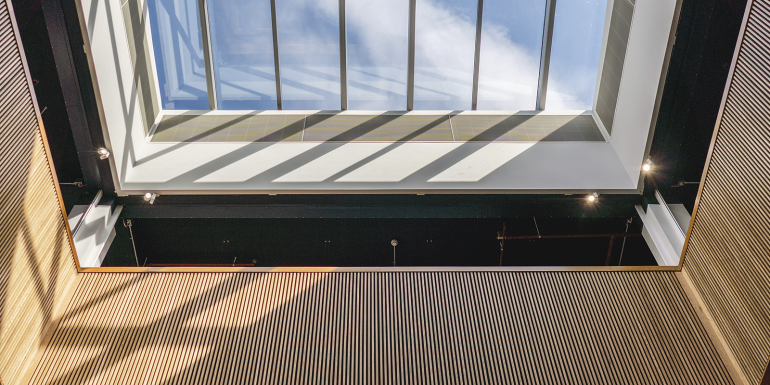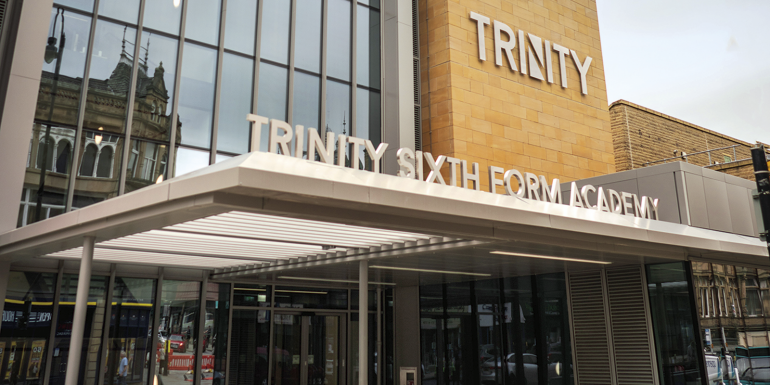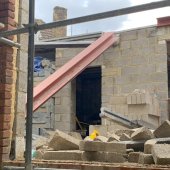Thinking outside the box

From small challenges to big issues, refurbishment projects are rarely without problems. As this case study shows, it’s all about problem-solving, communication and a sense of responsibility.
Halifax’s Northgate House, Trinity Sixth Form College project saw the refurbishment of an existing concrete 1970s building, which formerly housed a library and council office space for the client, Calderdale Metropolitan Borough Council. This article refers to the works completed at the former library section of the building to create a brand-new sixth form centre, which was jointly developed by Calderdale Council, Trinity Multi-Academy Trust and Rastrick High School.
The project was delivered as a construction management contract, with the various works being divided up by the professional team into packages that were tendered and subsequently awarded. Cardinal Project Management Ltd was successful in securing two different packages – TP500 (the internal fit-out package, consisting of walls, floors, ceilings, joinery, etc) and TP600 (the supply and installation of fixtures, furnishing and equipment).
Other contractors had already been engaged to complete the other packages – TP100 (demolition), TP200 (external cladding, windows and roofing), TP300 (building and structural works) and TP400 (mechanical and electrical works).
Issues encountered
As with most building projects, and certainly on refurbishment projects, a number of challenges were uncovered as the project progressed.
One of the reoccurring issues that Cardinal’s project team encountered was the interface between the different packages. One example was the supply and installation of automated louvres to various elevations over multiple floors of the building. These louvres, working in tandem with the building maintenance software (BMS) system, allow the building to breathe through a meticulous commissioning process that ensured all the ventilation and heating systems communicate with one another. This was a crucial part of the building’s overall redevelopment to ensure that the correct temperatures were being achieved, that the correct number of air changes were happening and that the laboratories could be used safely.
The supply and installation of the louvres sat in the TP200 package, the wiring and commissioning of the louvres sat in the TP400 package, while the internal finishes around the louvres (walls, plasterboard, flooring, etc) sat within Cardinal’s TP500 package.

The Northgate House refurbishment has transformed a tired 1970s concrete library building into a stunning, brand-new sixth form centre, despite a series of major setbacks
The setting out of the curtain walling within the TP200 package was completed incorrectly, and the subsequent late ordering of the louvres led to a number of clashes being highlighted on-site after the works had been undertaken. Once the professional team found out that the louvres would arrive late, the works within the TP500 package were instructed to be undertaken. However, on completion, the internal apertures didn’t align with the positions of the external supporting steelwork that had already been installed, and this is when it was discovered that the works completed in the TP200 package had been undertaken incorrectly.
Once the louvres were finally on-site, and following additional works being undertaken as part of the TP500 package to ensure that the apertures lined up, it was discovered that the cable routing positions agreed between the TP200 and TP400 contractors were also incorrect. At this stage, it was decided that it would be easier and quicker for the TP400 contractor to alter all its works to suit what the TP200 contractor had delivered to site.
This single example of some of the smaller challenges faced led to two massive pieces of additional work, because the external siting of the apertures was incorrectly executed. The lesson here is that setting out is crucial – not just to the immediate package of work but also to other trades following on. Collaboration from the start can save money and time.
Cardinal also faced a number of other major issues, including the building not being watertight and then the worldwide Coronavirus pandemic.

Challenging times
The internal fit-out works (TP500) were to start on-site in June 2019 within a watertight building. However, because of delays by the TP200 contractor, many areas had leaks penetrating the roof, and missing or incomplete curtain walling, while vast sections of the building were still open to the elements.
After lengthy discussions, Cardinal was engaged to complete rectification and completion works on the TP200 package to get the building watertight, so that the TP400, TP500 and TP600 packages could progress through to handover.
This first involved completion of a number of intricate surveys to the entire external façade to create a detailed schedule of defects that could be agreed on prior to being instructed. To this end, structural engineers, building control, fire officers, planning and the Cardinal team worked in unison to assess, using mobile elevating work platforms, each elevation in minute detail. Following on from these surveys, the schedules were created, agreed, costed, instructed and undertaken.
As Michael Brearey, Cardinal’s Construction Director, noted: “This challenge could have continued on for months without resolution, adding significant time and monies. However, a collaborative and practical attitude enabled us to drive the external works to completion, which, in turn, allowed the internal packages to then also be executed correctly and in a timely manner. We are proud to have been instrumental in creating and leading this golden thread through the project to ensure that the client was gaining best value, their tenant was getting exactly what they wanted and that the rest of the project team were able to deliver their works.”
Covid-19 created many different challenges. Strictly following government guidelines, Cardinal was able to continue the works at Northgate House in a structured and safe way to reduce the impact of the pandemic on the project delivery, while ensuring the health and wellbeing of employees and the supply chain.
Reduced numbers of workers, proactive planning of working areas and regular updates to the programme ensured that government protocols were always followed. The project allowed social distancing over the various parts of the building, but Cardinal also assigned two-person tasks to people from the same household to maintain adherence to the guidelines. Regular ad hoc visits by members of Cardinal’s health, safety, quality and environment team and also senior managers benchmarked the firm’s performance against the parameters it had put into place. Covid-19 testing was available, and anyone who was feeling unwell or showing symptoms was immediately directed to the site management team, following the Cardinal flowchart that was in place. Through this pragmatic approach, Cardinal was able to deliver the project to the same programme that it had set out prior to the pandemic.
For more, visit cardinal.ltd.uk









